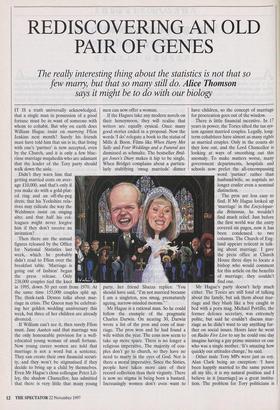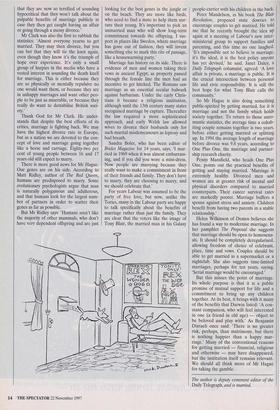REDISCOVERING AN OLD PAIR OF GENES
The really interesting thing about the statistics is not that so
few many, but that so many still do. Alice Thomson
says it might be to do with our biology
IT IS a truth universally acknowledged, that a single man in possession of a good fortune must be in want of someone with whom to cohabit. But why on earth does William Hague insist on marrying Ffion Jenkins next month? Surely his friends must have told him that sin is in, that living with one's 'partner' is now accepted, even by the Church, and it is only a few blue- rinse marriage mujahedin who are adamant that the leader of the Tory party should walk down the aisle.
Didn't they warn him that getting married costs on aver- age £10,000, and that's only if you make do with a gold-plat- ed ring and an off-the-peg dress; that his Yorkshire rela- tives may ridicule the way the Welshmen insist on singing alto; and that half his col- leagues might never forgive him if they don't receive an invitation?
If William can't see it, then surely Ffion must. Jane Austen said that marriage was the only honourable provision for a well- educated young woman of small fortune. Now young career women are told that marriage is not a word but a sentence. They can create their own financial securi- ty, and they won't be stigmatised if they decide to bring up a child by themselves. Even Mr Hague's close colleague Peter Lil- ley, the shadow Chancellor, has admitted that there is very little that many young men can now offer a woman.
If the Hagues take any modern novels on their honeymoon, they will realise that writers are equally cynical. Once many good stories ended in a proposal. Now the words 'I do' relegate a book to the status of Mills & Boon. Films like When Harry Met Sally and Four Weddings and a Funeral are dismissed as schmaltz. The bestseller Brid- get Jones's Diary makes it hip to be single. When Bridget complains about a particu- larly stultifying 'smug marrieds' dinner party, her friend Shazza replies: 'You should have said, "I'm not married because I am a singleton, you smug, prematurely ageing, narrow-minded morons."' Mr Hague is a rational man. So he could follow the example of the pragmatic Charles Darwin. On nearing 30, Darwin wrote a list of the pros and cons of mar- riage. The pros won and he had found a wife within the year. The cons now seem to take up more space. There is no longer a religious imperative. The majority of cou- ples don't go to church, so they have no need to marry in the eyes of God. Nor is there a moral imperative. Since the Sixties, people have taken more care of their record collection than their virginity. There is now no stigma in being born a bastard. Increasingly women don't even want to have children, so the concept of marriage for procreation goes out of the window.
There is little financial incentive. In 17 years in power, the Tories tilted the tax sys- tem against married couples. Legally, long- term cohabitees have almost as many rights as married couples. Only in the courts do they lose out, and the Lord Chancellor is looking at ways of smoothing out this anomaly. To make matters worse, many government departments, hospitals and schools now prefer the all-encompassing word 'partner' rather than husband/wife, so nuptials no longer confer even a nominal distinction.
The pros are less easy to find. If Mr Hague looked up `marriage' in the Encyclopae- dia Britannia, he wouldn't find much relief. Just before the first world war the entry covered six pages, now it has been condensed to two columns. The Church of Eng- land appears reticent in talk- ing about marriage. I gave the press office at Church House three days to locate a bishop who would comment for this article on the benefits of marriage; they couldn't find one.
Mr Hague's party doesn't help much either. The Tories are still fond of talking about the family, but ask them about mar- riage and they blush like a boy caught in bed with a porn mag. Michael Portillo, the former defence secretary, was extremely polite, but said he couldn't discuss mar- riage as he didn't want to say anything fur- ther on social issues. Hours later he went on Radio Five Live to say he could one day imagine having a gay prime minister or one who was a single mother. 'It's amazing how quickly our attitudes change,' he said.
Other male Tory MPs were just as coy, Alan Clark being an exception: 'I have been happily married to the same person all my life, it is my natural position and I believe in it [marriage] as a great institu- tion. The problem for Tory politicians is that they are now so terrified of sounding hypocritical that they won't talk about the palpable benefits of marriage publicly in case they then get caught having an affair or going through a messy divorce.'
Mr Clark was also the first to rubbish the statistics: 'Almost everyone yearns to get married. They may then divorce, but you can bet that they will tie the knot again, even though they know it's the triumph of hope over experience. It's only a small group of harpies in the media who have a vested interest in sounding the death knell for marriage. This is either because they are so physically or mentally repulsive no one would want them, or because they are in unhappy marriages and want other peo- ple to be just as miserable, or because they really do want to destabilise British soci- ety.'
Thank God for Mr Clark. He under- stands that despite the best efforts of its critics, marriage is fighting back. We may have the highest divorce rate in Europe, but as a nation we are devoted to the con- cept of love and marriage going together like a horse and carriage. Eighty-two per cent of young people between 16 and 17 years old still expect to marry.
There is more good news for Mr Hague. Our genes are on his side. According to Matt Ridley, author of The Red Queen, humans are predisposed to marry. Some evolutionary psychologists argue that man is naturally polygamous and adulterous, and that humans look for the largest num- ber of partners in order to scatter their genes as far as possible.
But Mr Ridley says: 'Humans aren't like the majority of other mammals, who don't have very dependent offspring and are just looking for the best genes in the jungle or on the beach. They are more like birds, who need to find a mate to help them nur- ture their young. It's important to pick an unmarried man who will show long-term commitment towards the offspring. I sus- pect in places like Sweden, where marriage has gone out of fashion, they will invent something else to mark this rite of passage, like a housewarming party.'
Marriage has history on its side. There is evidence of men and women taking their vows in ancient Egypt; as property passed through the female line the men had an incentive to get hitched. The Romans saw marriage as an essential secular bulwark against barbarism. Under the early Chris- tians it became a religious institution, although until the 13th century many states recognised marriage by capture. Thereafter the law required a more sophisticated approach, and early Welsh law allowed wives to divorce their husbands only for such marital misdemeanours as leprosy and bad breath.
Sandra Baler, who has been editor of Brides Magazine for 14 years, says, 'I mar- ried in 1969 when it was almost embarrass- ing, and if you did you wore a mini-dress. Now people are marrying because they really want to make a commitment in front of their friends and family. They don't have to many, they are choosing to marry, and we should celebrate that.'
For years Labour was assumed to be the party of free love, but now, unlike the Tories, many in the Labour party are happy to talk specifically about the benefits of marriage rather than just the family. They are clear that the voters like the image of Tony Blair, the married man in his Galaxy people-carrier with his children in the back.
Peter Mandelson, in his book The Blair Revolution, proposed state dowries to encourage couples to get married. He told me that he recently brought the idea up again at a meeting of Labour's new inter- ministerial group to support families and parenting, and this time no one laughed. `It's impossible not to believe in marriage, it's the ideal, it is the best policy anyone has yet devised,' he said. Janet Daley, a Daily Telegraph columnist, agreed: 'A love affair is private, a marriage is public. It is the crucial intersection between personal life and civic responsibility. It is still the best hope for what Tony Blair calls the community.'
So Mr Hague is also doing something public-spirited by getting married, for it is marriage and not the family which holds society together. To return to those unro- mantic statistics, the average time a cohab- iting couple remains together is two years, before either getting married or splitting up. In 1994 the average length of marriage before divorce was 9.8 years, according to One Plus One, the marriage and partner- ship research charity.
Penny Mansfield, who heads One Plus One, points out the practical benefits of getting and staying married. 'Marriage is extremely healthy. Divorced men and women are at greater risk of mental and physical disorders compared to married counterparts. Their cancer survival rates are markedly poorer. Marriage buffers a spouse against stress and anxiety. Children benefit from having two parents in a stable relationship.'
Helen Wilkinson of Demos believes she has found a way to modernise marriage. In her pamphlet The Proposal she suggests that marriage should be open to homosexu- als. It should be completely deregularised, allowing freedom of choice of celebrant, place, time and vows. Couples should be able to get married in a supermarket or a nightclub. She also suggests time-limited marriages, perhaps for ten years, saying, `Serial marriage would be encouraged.'
But this misses the point of marriage. Its whole purpose is that it is a public promise of mutual support for life and a commitment to bring up any children together. At its best, it brings with it many of the benefits that Darwin listed: 'A con- stant companion, who will feel interested in one (a friend in old age) — object to be beloved and play with.' As Benjamin Disraeli once said: 'There is no greater risk, perhaps, than matrimony, but there is nothing happier than a happy mar- riage.' Many of the conventional reasons for getting married — financial, religious and otherwise — may have disappeared, but the institution itself remains relevant. We should all think more of Mr Hague for taking the gamble.
The author is deputy comment editor of the Daily Telegraph, and is married.



















































































 Previous page
Previous page